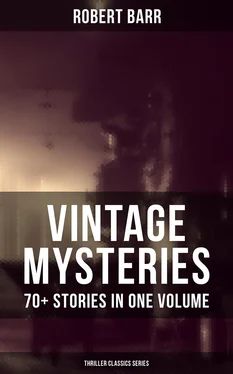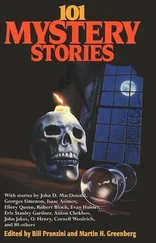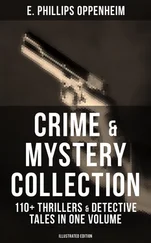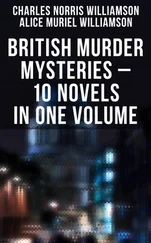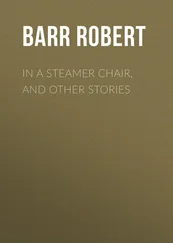'If you hear the police rummaging about while I'm away, pray assist them, with an expression of my distinguished consideration.'
I remember while I was chief detective in the service of the French Government being requested to call at a certain hour at the private hotel of the Minister for Foreign Affairs. It was during the time that Bismarck meditated a second attack upon my country, and I am happy to say that I was then instrumental in supplying the Secret Bureau with documents which mollified that iron man's purpose, a fact which I think entitled me to my country's gratitude, not that I ever even hinted such a claim when a succeeding ministry forgot my services. The memory of a republic, as has been said by a greater man than I, is short. However, all that has nothing to do with the incident I am about to relate. I merely mention the crisis to excuse a momentary forgetfulness on my part which in any other country might have been followed by serious results to myself. But in France—ah, we understand those things, and nothing happened.
I am the last person in the world to give myself away, as they say in the great West. I am usually the calm, collected Eugène Valmont whom nothing can perturb, but this was a time of great tension, and I had become absorbed. I was alone with the minister in his private house, and one of the papers he desired was in his bureau at the Ministry for Foreign Affairs; at least, he thought so, and said,—
'Ah, it is in my desk at the bureau. How annoying! I must send for it!'
'No, Excellency,' I cried, springing up in a self-oblivion the most complete, 'it is here.' Touching the spring of a secret drawer, I opened it, and taking out the document he wished, handed it to him.
It was not until I met his searching look, and saw the faint smile on his lips that I realised what I had done.
'Valmont,' he said quietly, 'on whose behalf did you search my house?'
'Excellency,' I replied in tones no less agreeable than his own, 'tonight at your orders I pay a domiciliary visit to the mansion of Baron Dumoulaine, who stands high in the estimation of the President of the French Republic. If either of those distinguished gentlemen should learn of my informal call and should ask me in whose interests I made the domiciliary visit, what is it you wish that I should reply?'
'You should reply, Valmont, that you did it in the interests of the Secret Service.'
'I shall not fail to do so, Excellency, and in answer to your question just now, I had the honour of searching this mansion in the interests of the Secret Service of France.'
The Minister for Foreign Affairs laughed; a hearty laugh that expressed no resentment.
'I merely wished to compliment you, Valmont, on the efficiency of your search, and the excellence of your memory. This is indeed the document which I thought was left in my office.'
I wonder what Lord Lansdowne would say if Spenser Hale showed an equal familiarity with his private papers! But now that we have returned to our good friend Hale, we must not keep him waiting any longer.
I well remember the November day when I first heard of the Summertrees case, because there hung over London a fog so thick that two or three times I lost my way, and no cab was to be had at any price. The few cabmen then in the streets were leading their animals slowly along, making for their stables. It was one of those depressing London days which filled me with ennui and a yearning for my own clear city of Paris, where, if we are ever visited by a slight mist, it is at least clean, white vapour, and not this horrible London mixture saturated with suffocating carbon. The fog was too thick for any passer to read the contents bills of the newspapers plastered on the pavement, and as there were probably no races that day the newsboys were shouting what they considered the next most important event—the election of an American President. I bought a paper and thrust it into my pocket. It was late when I reached my flat, and, after dining there, which was an unusual thing for me to do, I put on my slippers, took an easy-chair before the fire, and began to read my evening journal. I was distressed to learn that the eloquent Mr. Bryan had been defeated. I knew little about the silver question, but the man's oratorical powers had appealed to me, and my sympathy was aroused because he owned many silver mines, and yet the price of the metal was so low that apparently he could not make a living through the operation of them. But, of course, the cry that he was a plutocrat, and a reputed millionaire over and over again, was bound to defeat him in a democracy where the average voter is exceedingly poor and not comfortably well-to-do as is the case with our peasants in France. I always took great interest in the affairs of the huge republic to the west, having been at some pains to inform myself accurately regarding its politics, and although, as my readers know, I seldom quote anything complimentary that is said of me, nevertheless, an American client of mine once admitted that he never knew the true inwardness—I think that was the phrase he used—of American politics until he heard me discourse upon them. But then, he added, he had been a very busy man all his life.
I had allowed my paper to slip to the floor, for in very truth the fog was penetrating even into my flat, and it was becoming difficult to read, notwithstanding the electric light. My man came in, and announced that Mr. Spenser Hale wished to see me, and, indeed, any night, but especially when there is rain or fog outside, I am more pleased to talk with a friend than to read a newspaper.
' Mon Dieu , my dear Monsieur Hale, it is a brave man you are to venture out in such a fog as is abroad tonight.'
'Ah, Monsieur Valmont,' said Hale with pride, 'you cannot raise a fog like this in Paris!'
'No. There you are supreme,' I admitted, rising and saluting my visitor, then offering him a chair.
'I see you are reading the latest news,' he said, indicating my newspaper, 'I am very glad that man Bryan is defeated. Now we shall have better times.'
I waved my hand as I took my chair again. I will discuss many things with Spenser Hale, but not American politics; he does not understand them. It is a common defect of the English to suffer complete ignorance regarding the internal affairs of other countries.
'It is surely an important thing that brought you out on such a night as this. The fog must be very thick in Scotland Yard.'
This delicate shaft of fancy completely missed him, and he answered stolidly,—
'It's thick all over London, and, indeed, throughout most of England.'
'Yes, it is,' I agreed, but he did not see that either.
Still a moment later he made a remark which, if it had come from some people I know, might have indicated a glimmer of comprehension.
'You are a very, very clever man, Monsieur Valmont, so all I need say is that the question which brought me here is the same as that on which the American election was fought. Now, to a countryman, I should be compelled to give further explanation, but to you, monsieur, that will not be necessary.'
There are times when I dislike the crafty smile and partial closing of the eyes which always distinguishes Spenser Hale when he places on the table a problem which he expects will baffle me. If I said he never did baffle me, I would be wrong, of course, for sometimes the utter simplicity of the puzzles which trouble him leads me into an intricate involution entirely unnecessary in the circumstances.
I pressed my fingertips together, and gazed for a few moments at the ceiling. Hale had lit his black pipe, and my silent servant placed at his elbow the whisky and soda, then tiptoed out of the room. As the door closed my eyes came from the ceiling to the level of Hale's expansive countenance.
Читать дальше
